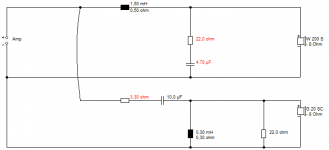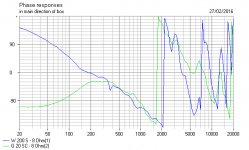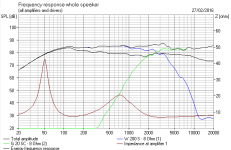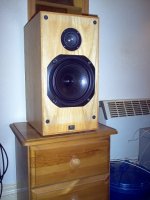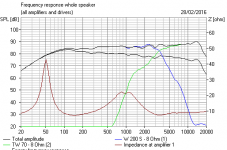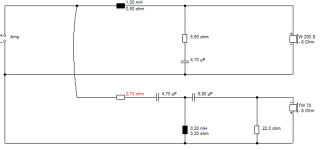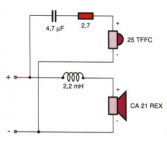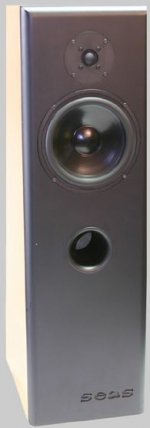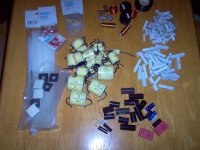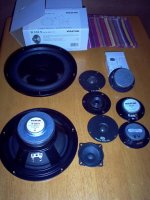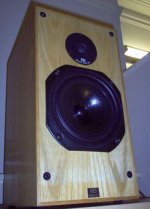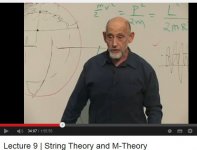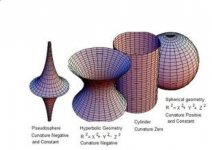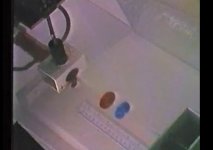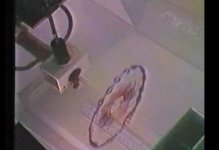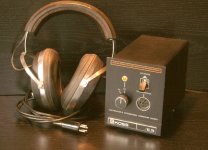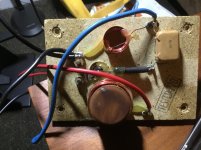Hi Steve,
10% will do for the drivers unless you are trying to get T/S parameters. Easily close enough to figure out what the rated impedance is for each driver.
10uF is in 4 ohm range, but something on the order of 12 dB/oct would be nice in a two way. Mine were all about 3 KHz when 2 way. Peerless had some nice tweeters that had a low F3 that could be rolled off lower. Took the stress off the woofers so you could use one with more woof than usual.
Hi slipmyster,
Did you measure your original tweeters, or do they have any writing that might be a clue as to what the impedance might be?
-Chris
From post #1.ime in the midle of referbing my mission 770 made in 1981 they are rated at 25-200 watts ive replaced the tweeters and the internal wireing so far and they sound fine as far as i can tell but i think the new tweeters should be brighter than they sound at the moment so was wondering it the caps will need replaceing. They are 33 years old or will they be ok sill as . Any advice would be a big help.
10% will do for the drivers unless you are trying to get T/S parameters. Easily close enough to figure out what the rated impedance is for each driver.
10uF is in 4 ohm range, but something on the order of 12 dB/oct would be nice in a two way. Mine were all about 3 KHz when 2 way. Peerless had some nice tweeters that had a low F3 that could be rolled off lower. Took the stress off the woofers so you could use one with more woof than usual.
Hi slipmyster,
Did you measure your original tweeters, or do they have any writing that might be a clue as to what the impedance might be?
-Chris
TBH, slipmyster is doing something quite interesting here, using his ears. 🙂
I had a look at the effect of a 10uf on the tweeter circuit. The 22R and 4.7uF is just my attempt to simulate a polycone with a paper cone, BTW. Polycones roll off faster.
It's actually rather good in most respects. That midrange bump will disappear off axis and retain an excellently flat power response around the room. Phase is good too.
Possibly the tweeter gets a bit strained at high volume, but who knows. I've seen worse with second order tweeter and simple bass coil.
I had a look at the effect of a 10uf on the tweeter circuit. The 22R and 4.7uF is just my attempt to simulate a polycone with a paper cone, BTW. Polycones roll off faster.
It's actually rather good in most respects. That midrange bump will disappear off axis and retain an excellently flat power response around the room. Phase is good too.
Possibly the tweeter gets a bit strained at high volume, but who knows. I've seen worse with second order tweeter and simple bass coil.
Attachments
Last edited:
Thank you everyone for your input.
I didn't want to change anything to change the way they sound to much everything I have changed has be through necessity. I changed the tweeters because one of the original seas units had a damaged dome and finding one of the 8ohm original seas units was impossible so I replaced them with the morel cat308 tweeters hoping not to change the sound too much. Same with the crossover's I've replaced the cap's because one was going bad so I replaced them like for like to keep the design as close to original as possible only bypassing the cheep fuse holders so as not to change the sound too much and I think to a certain degree it's been successful and I am happy with the way they have turned out and all your help and advice has learn me a lot for any future projects.
So thank you for taking the time to learn me so much.
Slipmyster
I didn't want to change anything to change the way they sound to much everything I have changed has be through necessity. I changed the tweeters because one of the original seas units had a damaged dome and finding one of the 8ohm original seas units was impossible so I replaced them with the morel cat308 tweeters hoping not to change the sound too much. Same with the crossover's I've replaced the cap's because one was going bad so I replaced them like for like to keep the design as close to original as possible only bypassing the cheep fuse holders so as not to change the sound too much and I think to a certain degree it's been successful and I am happy with the way they have turned out and all your help and advice has learn me a lot for any future projects.
So thank you for taking the time to learn me so much.
Slipmyster
Hi Slipmyster,
That's the name of the game. I'm glad it has worked out for you.
To listen is very important of course, but for finding tonal balance, use an FM tuner and find some place without a signal. Turn the volume up (muting off!) and listen to the inter-station hiss. Balance the sound using this noise source. With some practice you can get pretty good. But, let's be clear on this. To design a speaker, you need both measurements and listening sessions to get it right. I only wish the instruments were not necessary, but the two methods keep everything on track.
-Chris
That's the name of the game. I'm glad it has worked out for you.
To listen is very important of course, but for finding tonal balance, use an FM tuner and find some place without a signal. Turn the volume up (muting off!) and listen to the inter-station hiss. Balance the sound using this noise source. With some practice you can get pretty good. But, let's be clear on this. To design a speaker, you need both measurements and listening sessions to get it right. I only wish the instruments were not necessary, but the two methods keep everything on track.
-Chris
Thank you and thanks for the tip I'm really happy with the way they sound now they seem to have better integration of the drivers now and they just seem to be playing with Less effort.
Thanks again.
Slipmyster.
Thanks again.
Slipmyster.
Interesting article on the Mission 770 here:
Mission 770 - Article - History
Worth a look. It seems Mission could never quite decide on a final version... 😀
Mission 770 - Article - History
Worth a look. It seems Mission could never quite decide on a final version... 😀
Ohhh it's too early in the morning to read all that stuff
Interesting...and I like the chapter Polypropylene
🙄
PHtalates in the morning
Interesting...and I like the chapter Polypropylene
🙄
PHtalates in the morning
Good link Steve, the article brought back many memories of my first job in a hi-fi store from 1982 onwards. I still have my Rogers LS7 with their polypropylene drivers, LOL
TBH, I can read a crossover schematic like some people read Egyptian Hieroglyphics.Good link Steve, the article brought back many memories of my first job in a hi-fi store from 1982 onwards. I still have my Rogers LS7 with their polypropylene drivers, LOL
Rogers Loudspeakers › LS7
Where Rogers could have learned a thing or two, in hindsight, was in the high frequency impedance. I fit that 22R tweeter shunt to make it work better with most amps.
But it's a 90 degree phase third order filter, which solves most of the power problems.
You can do simpler filters, like the first order SEAS Njord. Not my cup of tea. It distorts (sounds rough) at high volume with complex material. My current wheeze is still a the classic Celestion/KEF third order tweeter. Very flat impedance and BW3. Paper bass is still my preference too.
Attachments
It's a Monacor HT22/8 cone tweeter.
https://www.bluearan.co.uk/index.php?id=MON100180
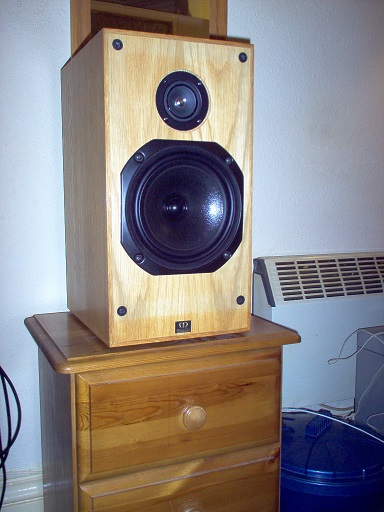
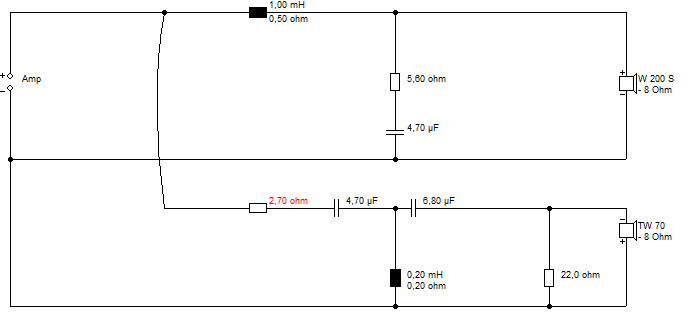
Not bad for £6, IMO, and flatter than the TW70 which I use for modelling. But still needs a good crossover IMO.
https://www.bluearan.co.uk/index.php?id=MON100180


Not bad for £6, IMO, and flatter than the TW70 which I use for modelling. But still needs a good crossover IMO.
Hi Steve,
A nice dome tweeter would really sound nice compared to that one. Textile dome (forgiving) or Aluminum dome (not forgiving at all). Their f3 would be lower for a 1" dome. Exactly what a 2 way speaker needs.
-Chris
A nice dome tweeter would really sound nice compared to that one. Textile dome (forgiving) or Aluminum dome (not forgiving at all). Their f3 would be lower for a 1" dome. Exactly what a 2 way speaker needs.
-Chris
TBH, Chris, I revived my interest in speakers with these below SEAS 19TAF/G metal dome Monitor Audio R300-MD speakers. They sounded rubbish at £60 second-hand. One tweeter had dried up ferrofluid, and just was silent.
Simple 1.6mH bass coil and 2.2R + 3.3uF/0.27mH second order tweeter.
I actually doubt if I'd have improved things with a fuzzy textile dome. But I tried it with Morel CAT 298 units. And mylar tweeters. No cigar.
Of course, small dome tweeters have better dispersion, but that can create a discontinuity in power response with a narrow beaming 8" unit like this Sonics Arkadia by Joachim Gerhard. SEAS CA22RNX and typical 1" SEAS soft dome.
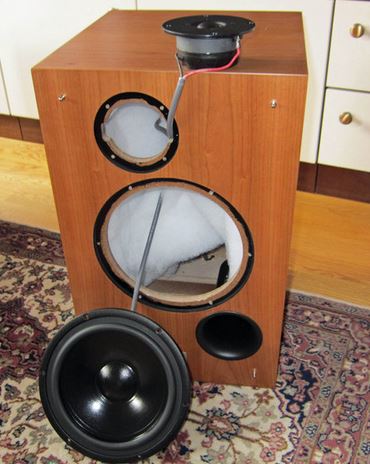
Now Joachim crossed it quite low, which is one way of doing things.
But actually, I genuinely like cone tweeters. I've tried other stuff. If pushed, I'd say ring radiators are good too. And I don't mind metal domes with a bit of essential filter treatment at the very top end. 😀
Simple 1.6mH bass coil and 2.2R + 3.3uF/0.27mH second order tweeter.
I actually doubt if I'd have improved things with a fuzzy textile dome. But I tried it with Morel CAT 298 units. And mylar tweeters. No cigar.
Of course, small dome tweeters have better dispersion, but that can create a discontinuity in power response with a narrow beaming 8" unit like this Sonics Arkadia by Joachim Gerhard. SEAS CA22RNX and typical 1" SEAS soft dome.

Now Joachim crossed it quite low, which is one way of doing things.
But actually, I genuinely like cone tweeters. I've tried other stuff. If pushed, I'd say ring radiators are good too. And I don't mind metal domes with a bit of essential filter treatment at the very top end. 😀
Attachments
Hi Steve,
Well, that explains that pretty clearly. The popular cone / dome tweeter around here for years was a terrible creation. A "Phenolic ring tweeter" that used it's dust cover as a radiator as well. It sounded terrible at all frequencies. The only worse sounding thing I've heard are the Motorola Piezo tweeters. Many didn't understand how they worked and used a normal pre-made crossover unit. Really horrible sounding combination.
Enjoy!
Well, that explains that pretty clearly. The popular cone / dome tweeter around here for years was a terrible creation. A "Phenolic ring tweeter" that used it's dust cover as a radiator as well. It sounded terrible at all frequencies. The only worse sounding thing I've heard are the Motorola Piezo tweeters. Many didn't understand how they worked and used a normal pre-made crossover unit. Really horrible sounding combination.
Enjoy!
TBH, Chris, I like to check my ideas against the very state-of-the-art sometimes. A certain friend of mine has 5 of these scanspeak/RAAL Ribbon speakers built into his home-cinema wall. I have no idea how much he has spent, but combined with digital crossovers and 6 huge amplifiers, one of which does the bass, I'd be surprised if it comes to less than £100,000 of audio splendour. 😀
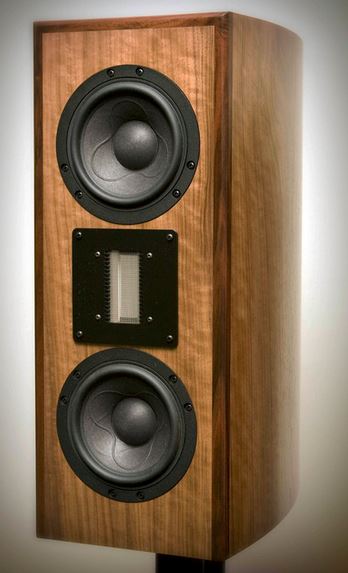
For all that, his source is a mere 150 Euro a year subscription to the Berlin Philarmonic Orchestra's (under Simon Rattle conducting) entire Audio-Visual repertoire. Beethoven's 9th never sounded better. 😎
We truly don't have a material capable of reproducing the 15kHz top end of the audio range, unless you include toxic Beryllium. But I mistrust anything to do with spherical domes for musical entertainment. Be it dustcaps or domes. I could quote String Theory, geometry or those fascinating vortices. We have a way to go.

For all that, his source is a mere 150 Euro a year subscription to the Berlin Philarmonic Orchestra's (under Simon Rattle conducting) entire Audio-Visual repertoire. Beethoven's 9th never sounded better. 😎
We truly don't have a material capable of reproducing the 15kHz top end of the audio range, unless you include toxic Beryllium. But I mistrust anything to do with spherical domes for musical entertainment. Be it dustcaps or domes. I could quote String Theory, geometry or those fascinating vortices. We have a way to go.
Attachments
Hi Steve,
We have many technologies that will easily reproduce higher than 20 KHz. Dome tweeters included. A 3/4" dome in a three way setup would be better than the two way 1" dome combo. What I don't see is cone breakup to the extend you might be suggesting. The Al dome works just fine. But, if you are wishing for a more perfect radiator ... Plasma. You haven't lived until you repair those things.
If you are actively crossed over, you now have full control of the driver in question. IMO, that is the only way to achieve high fidelity. Until then, I'll soldier on with my passive crossovers.
-Chris
We have many technologies that will easily reproduce higher than 20 KHz. Dome tweeters included. A 3/4" dome in a three way setup would be better than the two way 1" dome combo. What I don't see is cone breakup to the extend you might be suggesting. The Al dome works just fine. But, if you are wishing for a more perfect radiator ... Plasma. You haven't lived until you repair those things.
If you are actively crossed over, you now have full control of the driver in question. IMO, that is the only way to achieve high fidelity. Until then, I'll soldier on with my passive crossovers.
-Chris
Capacitor for mission 770
I am new to this forum and also very very new to speaker restoration. I inherited a pair of Mission 770s from my uncle who recently passed away. They are in need of recapping. The caps are labeled 100 63. Would that be a 100uf 63 volt capacitor? The resistors are not labeled. Does anyone know their value? Also, I am torn between fixing the old XO or replacing them with modern ones. I think I will try to repair the existing ones first, but does anyone have any suggestions on premise replacements?
Thanks!
Nate
I am new to this forum and also very very new to speaker restoration. I inherited a pair of Mission 770s from my uncle who recently passed away. They are in need of recapping. The caps are labeled 100 63. Would that be a 100uf 63 volt capacitor? The resistors are not labeled. Does anyone know their value? Also, I am torn between fixing the old XO or replacing them with modern ones. I think I will try to repair the existing ones first, but does anyone have any suggestions on premise replacements?
Thanks!
Nate
Attachments
- Status
- Not open for further replies.
- Home
- Loudspeakers
- Multi-Way
- mission 770 crossover
